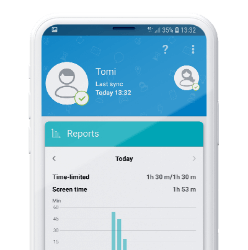Is AI enabling a new wave of cyberbullying?
The digitally native generation uses digital means to have fun, but also to hurt each other.
To help, we have prepared a list of signals that might indicate that your child is a victim of digital bullies.
Visible physical changes
Has your child suddenly lost weight or appetite? Do they have trouble sleeping during the night and look stressed out in the morning? Those might be signs of many things, but if combined with some of the points mentioned below, there is a good chance that your child is being bullied (on or offline).
Sudden loss of interest
Did your child use to love football or playing guitar, but suddenly lost all interest? This, in combination with other factors, might also be a sign that somebody is giving them a hard time.
Nervousness, sudden mood changes and snappy answers
Frequent moods swings do not necessarily mean that your child is being harassed by a bully. However, if these are accompanied by snappy responses or jumpy and nervous reactions - especially after using social media - it’s time to ask if they are having trouble.
It is important to note that parents should not be satisfied with responses such as “good” or “fine”, as these don’t always mean everything is good and fine. Sometimes it is necessary to dig deeper to figure out how your child really feels about their experience online.
Pretending to be sick to avoid school
“I don’t feel so good. Can I skip school today?” Almost every child uses excuses like this from time to time. Be it an exam they did not prepare for or just a difficult day ahead of them, it is common to avoid whatever is causing distress. However, if your child pretends to be ill too often, or for a prolonged period, there might a more serious issue at hand - such as fear of an inevitable conflict with a bully.
Deleted social network profile
If your child suddenly quits their favourite social network, be wary. In an age where young people invest a lot of time building their digital life, deleting an account should set off an alarm. Parental control tools, installed on a child’s device, can give parents a good overview of which apps they use and help identify any sudden changes in that usage.
Abnormal social withdrawal
It is only natural that teenagers are trying to become more independent from their parents. This may involve devoting more time to building their own social networks. However, if they start to distance themselves from family as well as friends, hide from the outside world and avoid social media, something is probably amiss.
Good communication techniques
Becoming an adult is a complicated journey and teenagers often show some of the above-mentioned signs even if they don’t have to cope with cyberbullies. However, parents (and teachers) should be wary if these symptoms start to pile up and should be ready to offer a helping hand.
You can use a non-confrontational approach when talking to your child about the issue by telling them stories that happened to other people - to your friends or their children. Do not forget to add how they succeeded in resolving an issue. Use these stories as an analogy to what you suspect might be happening to your child. It eases the situation for a child when talking about an unpleasant experience is difficult for them. They may “open up” more as this type of conversation can make them feel they are not alone in experiencing such problems, and it can let them know that you understand and can help.


With ESET Parental Control for Android
TRY FREE FOR 30 DAYSThe digitally native generation uses digital means to have fun, but also to hurt each other.
Cyberbullying can significantly affect children’s confidence and cause them to lose hope in the kindness of others. Especially if they are left to deal with their emotions on their own. How should parents proceed when they think their child may be a victim of cyberbullying? And how can they help them get back on their feet? We discussed the topic in detail with Jarmila Tomkova, a child psychologist.
As in the real world and also online, your kids may encounter inappropriate behaviour as well as initiate it. How can you guide them to make the right choices and avoid making and affiliating with wrong choices?